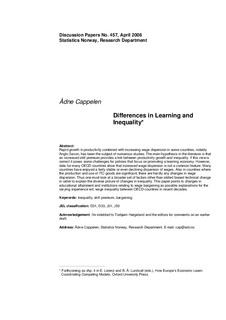| dc.contributor.author | Cappelen, Ådne | |
| dc.date.accessioned | 2011-11-20T18:59:22Z | |
| dc.date.available | 2011-11-20T18:59:22Z | |
| dc.date.issued | 2006 | |
| dc.identifier.issn | 1892-753x | |
| dc.identifier.uri | http://hdl.handle.net/11250/180695 | |
| dc.description | Forthcoming as chp. 4 in E. Lorenz and B.-Å. Lundvall (eds.), How Europe’s Economic Learn:
Coordinating Competing Models, Oxford University Press | no_NO |
| dc.description.abstract | Abstract:
Rapid growth in productivity combined with increasing wage dispersion in some countries, notably
Anglo-Saxon, has been the subject of numerous studies. The main hypothesis in the literature is that
an increased skill premium provides a link between productivity growth and inequality. If this view is
correct it poses some challenges for policies that focus on promoting a learning economy. However,
data for many OECD-countries show that increased wage dispersion is not a common feature. Many
countries have enjoyed a fairly stable or even declining dispersion of wages. Also in countries where
the production and use of ITC-goods are significant, there are hardly any changes in wage
dispersion. Thus one must look at a broader set of factors other than skilled biased technical change
in order to explain the diverse picture of changes in inequality. This paper points to changes in
educational attainment and institutions relating to wage bargaining as possible explanations for the
varying experience wrt. wage inequality between OECD-countries in recent decades.
Keywords: Inequality, skill premium, bargaining | no_NO |
| dc.language.iso | eng | no_NO |
| dc.publisher | Statistics Norway, Research Department | no_NO |
| dc.relation.ispartofseries | Discussion Papers;No. 457 | |
| dc.subject | Learning economy | no_NO |
| dc.subject | Productivity growth | no_NO |
| dc.subject | Skill premium | no_NO |
| dc.subject | Inequality | no_NO |
| dc.subject | JEL classification: D31 | no_NO |
| dc.subject | JEL classification: D33 | no_NO |
| dc.subject | JEL classification: J31 | no_NO |
| dc.subject | JEL classification: J50 | no_NO |
| dc.title | Differences in Learning and Inequality | no_NO |
| dc.type | Working paper | no_NO |
| dc.subject.nsi | VDP::Social science: 200::Economics: 210::Economics: 212 | no_NO |
| dc.source.pagenumber | 32 s. | no_NO |
